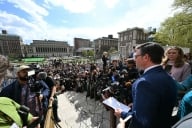You have /5 articles left.
Sign up for a free account or log in.
A federal appeals court on Tuesday revived a lawsuit brought by students who complained when Valencia College instructors allegedly pressured them to learn on one another how to conduct vaginal probes -- a technique taught in a sonography program.
The college has since barred the practice of using students to conduct such training, but a lawsuit over the issue raised concerns over student speech rights, and a lower court's ruling in the case alarmed many advocates for student free speech rights. The lawsuit is against instructors who are alleged to have pressured the students to undergo the probes from fellow students and who are alleged to have retaliated against students who objected. The practice that was in place at Valencia when the controversy broke in 2015 is not common at other institutions.
The ruling by the U.S. Court of Appeals for the 11th Circuit -- as is standard in appeals of lower court rulings dismissing cases -- assumed that the allegations were correct and ruled on the legal issues, not on whether plaintiffs had provided proof for the allegations.
Of concern to advocates for student speech rights was the logic of a federal district court that dismissed the lawsuit on the grounds that the students were engaged in "school-sponsored" speech, which schools and colleges have leeway to regulate. That ruling prompted the Foundation for Individual Rights in Education, the Student Press Law Center and other groups to file briefs saying that the judge's decision limited students' speech rights in ways that have never been intended.
The appeals court agreed. While the program that used students to teach one another how to conduct vaginal probes was a college-sponsored event, students who spoke out against the training were expressing their own views, not those of the college, the court ruled in its decision.
The appeals court said that, under prior Supreme Court rulings, there are strict definitions for when student speech can be deemed to be "sponsored" by a school or college: such speech must be perceived as having "the imprimatur of the school," faculty members must supervise the activity and "the activity, by design, imparts knowledge or skills to students or audiences."
In this case, those requirements are not met, the appeals court ruled. "The speech at issue -- the students’ complaints to the employees about the transvaginal ultrasounds -- is not school-sponsored expression," the decision said. "Private complaints from individual students do not 'bear the imprimatur of the school.'"
The proper standard for the case, the appeals court said, was speech that simply has taken place on the grounds of the college. And under that standard, a college could only take action against student speech that would cause a serious disruption, which the appeals court said was not the case here.
The appeals court also reversed the district judge's ruling that a vaginal probe without a person's consent was not unconstitutional under the Fourth Amendment, which bars unreasonable searches. On this issue, the court noted that many court rulings have found that physical procedures (such as collecting blood or other tissue) can constitute unreasonable searches. Further, the court noted that these probes can be painful to some women and embarrassing to others, especially if performed by fellow students.
"Inserting a probe into a woman’s vagina is plainly a search when performed by the government," the appeals court ruled.








